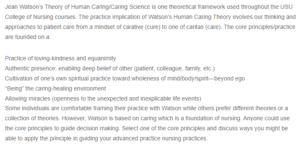Jean Watson’s Theory of Human Caring
Jean Watson’s Theory of Human Caring core principles includes being open to inexplicable and unexpected life events termed as miracles, practicing equanimity and loving kindness, being in a caring-healing environment, cultivating an individual’s spirituality to attain a wholeness of spirit, body, and mind and authentic presence (Gunawan et al., 2022). Nonetheless, this discussion describes how the core principle of authentic presence guides advanced practice nursing practices. Advanced practice nurses incorporate the core principle of authentic presence in their practice. Nurses aim to individually understand a patient and their families and friends. Through authentic presence, patients have increased trust and openness with their nurses, which improves patient outcomes (Gunawan et al., 2022). Authenticity allows nurses to recognize the need for assistance from patients. Nurses practice authentic presence through careful selection of words when speaking to patients, touch, eye contact, use of the right tone during conversations with a patient, and physical closeness.
Although physical touch and closeness are essential for authenticity, nurses must ensure they do not make the patient uncomfortable. Understanding a patient’s beliefs guides the nurse on authentic ways to interact with a patient. Some patients’ beliefs do not allow physical touch or closeness to an individual of the opposite gender. Nurses communicate with a reassuring tone to comfort a patient. Practices such as maintaining eye contact and head nodding assure the patient that the nurse is keen and willing to listen to their problem. Advanced practice nurses ensure authenticity by understanding a patient’s religion and culture. A patient’s beliefs dictate their selected therapy and compliance with medication (Kelly et al., 2022). Some patients’ beliefs are against the use of conventional medicines and support the use of herbal medicines. A patient’s family and friends are their support system through their healing journey; therefore, a nurse must understand their views and beliefs regarding the patient’s condition and therapy.
References
Gunawan, J., Aungsuroch, Y., Watson, J., & Marzilli, C. (2022). Nursing Administration: Watson’s Theory of Human Caring. Nursing Science Quarterly, 35(2), 235–243. https://doi.org/10.1177/08943184211070582.
Kelly, E. P., Myers, B., Henderson, B., Sprik, P., White, K. B., & Pawlik, T. M. (2021). The influence of patient and provider religious and spiritual beliefs on treatment decision-making in the cancer care context. Medical Decision Making, 42(1), 125–134. https://doi.org/10.1177/0272989×211022246.
ORDER A PLAGIARISM-FREE PAPER HERE
We’ll write everything from scratch
Question
Jean Watson’s Theory of Human Caring/Caring Science is one theoretical framework used throughout the USU College of Nursing courses. The practice implication of Watson’s Human Caring Theory evolves our thinking and approaches to patient care from a mindset of carative (cure) to one of caritas (care). The core principles/practice are founded on a:

Jean Watson’s Theory of Human Caring
Practice of loving-kindness and equanimity
Authentic presence: enabling deep belief of other (patient, colleague, family, etc.)
Cultivation of one’s own spiritual practice toward wholeness of mind/body/spirit—beyond ego
“Being” the caring-healing environment
Allowing miracles (openness to the unexpected and inexplicable life events)
Some individuals are comfortable framing their practice with Watson while others prefer different theories or a collection of theories. However, Watson is based on caring which is a foundation of nursing. Anyone could use the core principles to guide decision making. Select one of the core principles and discuss ways you might be able to apply the principle in guiding your advanced practice nursing practices.

